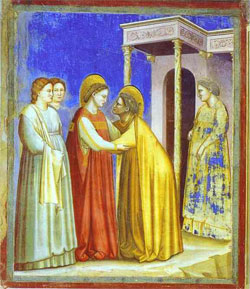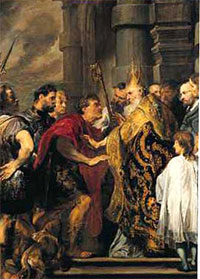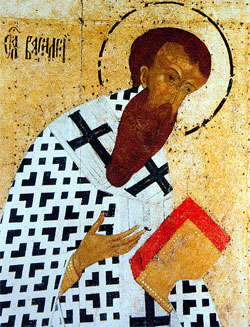Taking Sides: Reversals
For Sunday December 11, 2005
Third Sunday in Advent
Lectionary Readings (Revised Common Lectionary, Year B)
Isaiah 61:1–4, 8–11
Psalm 126 or Luke 1:47–55
1 Thessalonians 5:16–24
John 1:6–8, 19–28
 |
Norm Carroll (far left) at Stanford. |
Last night on television I watched Norm Carroll speak to Palo Alto's Human Relations Committee, urging them to advise our City Council members to stop using the word "homeless" when referring to people like himself. Carroll objects to that word much as an ethnic minority resents a racial slur. He prefers the word "un-housed," which accurately describes his lack of a structure, whereas "homeless" implies that he is an outsider without a place. Carroll definitely considers Palo Alto his place or home, even though he lacks a house. He is a frequent speaker at our City Council meetings, and an activist who helps the city's un-housed people.
 |
Oil executives at Senate hearing. |
The night before on C-Span I watched a Senate hearing where senior executives from Exxon-Mobil, Chevron, ConocoPhillips, British Petroleum, and Royal Dutch/Shell defended their record-breaking $33 billion in quarterly profits at a time of sky high gas prices. A few weeks ago Exxon reported a quarterly profit of $9.9 billion, the largest in U.S. corporate history. According to a new report from the Institute for Policy Studies and United for a Fair Economy, "the ratio of average CEO pay (now $11.8 million) to worker pay (now $27,460) spiked up from 301-to-1 in 2003 to 431-to-1 in 2004. If the minimum wage had risen as fast as CEO pay since 1990, the lowest paid workers in the US would be earning $23.03 an hour today, not $5.15 an hour."1
Helping the homeless and parsing corporate compensation are complex issues; I can't pretend to know much about either. People with good intentions take widely divergent positions on how we should respond to poor people and rich corporations; but whether one should engage these matters is, for the Christian, beyond dispute. As I read the Scriptures for this week, God looks and feels biased. He seems to take sides, and not just about wealth. These Biblical texts are so uncompromising that it is tempting to "spiritualize" them in order to soften them. Instead, I think we should take them at face value as a declaration that the advent of God's kingdom subverts our ordinary ways of doing political and socio-economic business.
 |
The Visitation of Mary by the angel Gabriel, Giotto di Bondone, 1302-1305. |
In Luke's Gospel, the pregnant teenager Mary, the mother of Jesus, moves from the deeply personal to the explicitly political in her famous Magnificat (the first word in the Latin text, "magnifies"). God, Mary exclaims, "has been mindful of the humble state of His servant...the Mighty One has done great things for me." This peasant girl who a few months later would bear the Son of God then praises God the Mighty One because He has "brought down rulers from their thrones but has lifted up the humble. He has filled the hungry with good things but has sent the rich away empty" (Luke 1:48–49, 52–53).
Liberal and conservative Christians alike have curried political favor through the ages, and fawned over the rich, but every once in a while someone speaks Marian truth to power. Her Magnificat reminds me of the famous humiliation of emperor Theodosius the Great, the last emperor of the undivided empire, by bishop Ambrose of Milan (340–397). After Theodosius slaughtered 7,000 people in Thessalonika "most unjustly and
 |
Saint Ambrose refuses Theodosius entrance to the Cathedral of Milan. |
A few pages later Luke records the first public words spoken by Jesus, expanding the scope of God's biases far beyond wealth and political power. After his temptation in the desert, Jesus "returned to Galilee in the power of the Spirit." One sabbath he entered a synagogue in Nazareth where he had grown up, and when he was invited to speak he unrolled a scroll and read from the poetry of Isaiah for this week (Isaiah 61:1–3):
The Spirit of the Sovereign Lord is on me,
because the Lord has anointed me
to preach good news to the poor.
He has sent me to bind up the brokenhearted,
to proclaim freedom for the captives
and release for the prisoners,
to proclaim the year of the Lord's favor
and the day of vengeance of our God,
to comfort all who mourn,
and provide for those who grieve in Zion—
to bestow on them a crown of beauty
instead of ashes,
the oil of gladness
instead of mourning,
and a garment of praise
instead of a spirit of despair.
When Jesus finished, writes Luke, he rolled up the scroll, handed it to the attendant, and sat down. With "the eyes of everyone in the synagogue fastened on him," Jesus then dropped a bombshell: "Today this scripture is fulfilled in your hearing." That is, His entire life, death and resurrection were given to fulfill these ancient words of Isaiah.
 |
St. Basil the Great. |
About the same time that Ambrose ministered in Italy, Saint Basil the Great (330–379) served as Bishop of Caesarea in central Turkey. Like Ambrose he too spoke Marian truth to the powerful emperor Valens who tried to intimidate him. In 372 Valens sent his proxy Modestus to Caesarea, where he summoned the frail but fiery Basil. Basil dumbfounded Valens with his boldness in a famous incident recorded in his biography. When Modestus threatened Basil with confiscation, exile, torture, and death, Basil stood firm. Modestus remarked that no one had ever spoken to him so rashly, to which Basil replied, "Perhaps you have never met a bishop before."
One of ten children born into a wealthy family, Basil experienced a crisis of faith provoked by his sister Macrina who challenged him about his worldly ambition, saying he was “puffed up beyond measure with the pride of oratory.” Basil relates how he "then read the Gospel, and saw there that a great means of reaching perfection was the selling of one's goods, the sharing of them with the poor, the giving up of all care for this life, and the refusal to allow the soul to be turned by any sympathy towards things of earth" (Ep. ccxxiii).
Basil distinguished himself as a pastor, theologian, writer, and administrator, but many remember him most for his outspoken advocacy of the oppressed, the brokenhearted, and those burdened with what Isaiah called "a spirit of despair." He excommunicated people who owned houses of prostitution, and objected to usury and unjust taxes. During a famine in the years 367–368, he sold his family inheritance to feed the starving. Basil built hospitals to care for the sick, the xenodocheion or "houses for strangers," and the ptocheion or "places for the poor." These institutions became so effective that the pagan emperor (and Basil's former classmate) Julian the Apostate modeled his own welfare efforts after these Christian ones. Basil also did menial work in the kitchens, and objected to any distinctions between Jew and Christian, rich and poor. Do we not all have the same digestive system, he asked? In his scathing sermons entitled Against the Rich he blasted people who hoarded wealth while the poor starved, who adorned their horses with luxurious finery while their neighbors wore tattered rags, and who let corn rot in granaries and be eaten by rats rather than use it to help the poor: “What kind of punishment, do you think, is deserved by a man who passes the hungry without giving them a sign?”
Mary and Jesus, Ambrose and Basil, each in their own way lived and spoke about the biases of God's heart. They raised their voices in prophetic protests. Beyond that they extended compassionate care to the weak and the marginal. In doing so they signaled the advent of God's kingdom and a reversal of the ordinary ways of the world.
For further reflection:
* Cf. Jaroslav Pelikan, Mary Through the Centuries: Her Place in the History of Culture (1998).
* In what sense, if at all, does God favor the poor and oppose the rich?
* Can you recall an instance when a spiritual leader rebuked a powerful person?
[1] http://www.faireconomy.org/press/2005/EE2005_pr.html.





